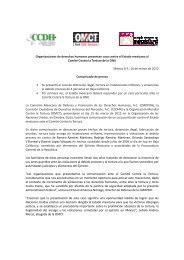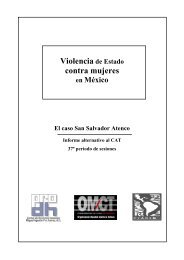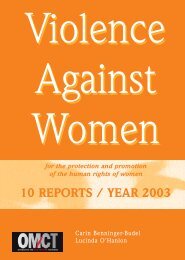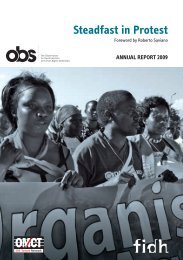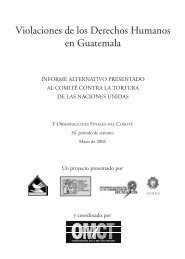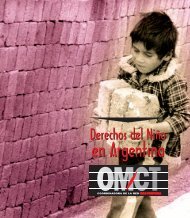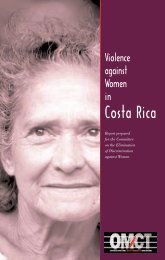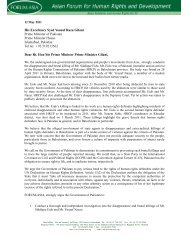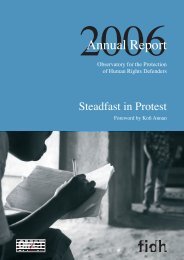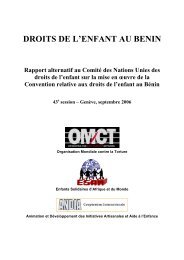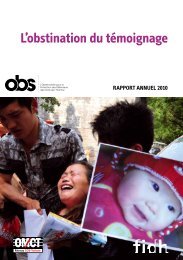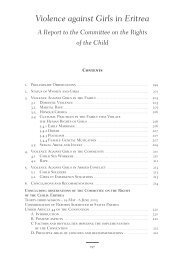eng - World Organisation Against Torture
eng - World Organisation Against Torture
eng - World Organisation Against Torture
Create successful ePaper yourself
Turn your PDF publications into a flip-book with our unique Google optimized e-Paper software.
Delivery to the Proper Judicial AuthoritiesIn accordance with Article 125 of the RPC 40 ,the investigating police officer must forwardthe case of a child accused to have committeda crime to the appropriate official forthe conduct of an inquest investigation withina maximum of 36 hours. In practice, it isusual for a child to have his inquest investigationperformed within 48 hours of arrest.In addition, it is not considered necessary tobring to the inquest investigation those whohad been arrested with a warrant, because itis presumed that they were afforded theirrights to submit refuting evidence at the preliminaryinvestigation stage, however thesepresumptions are often unfounded.Article 125 of the RPC requires the deliveryof an accused to the “proper judicial authorities”within the required time limits.However, most of the child respondents hadno recollection of attending any inquest investigationor interview with any prosecutoror judge after their arrest. The informationfiled by the prosecutor in court is not signedby the accused and there is no proof that thechild was actually brought before the judicialauthorities. Many of the police officersinterviewed informally stated that they wouldoften only bring the papers for signature by35the prosecutor, who will conduct the inquestinvestigation without seeing the accused.Regarding practice, it is difficult to considerthat the authorised officer conducting theinquest investigation is really fulfilling a judicialfunction. He or she is merely fulfillingan administrative formality. While the authorisedofficer has the power to file the casein court or to drop the charges, there are severalpreliminary orders outside his realm ofauthority. For example, the authority to havethe child released on recognisance or bail,or transferred to a Youth Detention Home ora Youth Detention Centre. It would take betweentwo weeks to several months for a minorto be arraigned in court, during whichtime he is detained in an adult jail. Withoutlegal counsel, the child has little or no opportunityto assert his legal rights to due processand fairness even at the early stage ofthe proceedings.40 - Basic International Human Rights Laws demands that anaccused be brought promptly before the proper judicial authoritiesin order to question the circumstances of his detention.Article 125 of the RPC indicates that the purposeof bringing the accused before the inquest investigation isto provide him to submit controverting evidence to the prosecutorand chall<strong>eng</strong>e the legality of his detention. Article125 is an attempt to fulfill the State’s obligations under theICCPR (Article 9(3) and the ICRC (Article 37(d)). Theselaws establish the right of an arrested person to be broughtpromptly before a judge or other officer authorized by law.The function of these officers is to decide whether there issufficient evidence against the accused as to warrant theircontinued detention.



